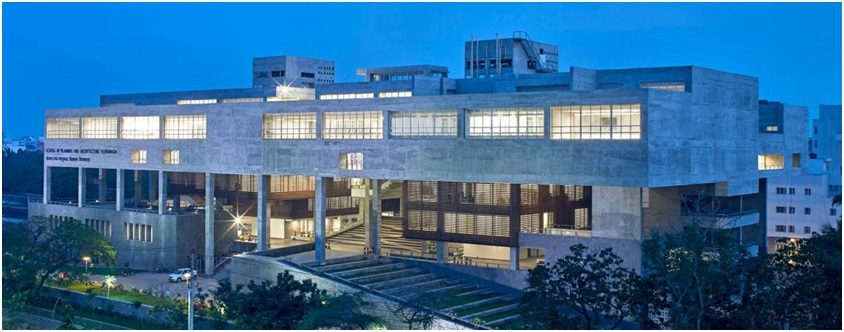Campus Highlight

The permanent campus of SPA Vijayawada is at the heart of Vijayawada city at ITI road and is approximately 10 acres, which hosts a set of iconic buildings with award winning designs that evolved in an environment friendly campus master plan. The campus accommodates the main iconic Academic and Administrative Block, the students� residential blocks, and a dining cum guest house block. SPA Vijayawada's student housing designs got the prestigious international "Eurasian Prize for 2018" in the category of �Low and Mid-rise Housing� in Architecture. Also, the School of Planning and Architecture, Vijayawada overall campus design has received the �GRIHA Exemplary Performance Award for 2018� under the category �Passive Architecture Design�.
The Academic Block has total built-up area of around 30,000 sqm, the Boys hostels spread over two blocks and the Girls hostels is about 20,200 sqm of built-up area. The Dining cum Guest House is about 4,300 sqm of built-up space. The hostels cater for about 777 occupants and the Guest House can host about 25 guests at a time.
Innovative Aspects of Campus Infrastructure
The form and structure of the Academic and Administrative block is deemed to be outstanding in the city of Vijayawada and is infused with local materials and contemporary brutalist and minimalist design. The buildings in the campus capture maximum natural lighting and ventilation through multi-level courtyards and lightwells. It has several unique architectural and structural features of innovation.

Multi-level courtyards within the campus: Play of Light and Shadows
The campus is energy efficient and environment friendly in many aspects. The entire rainwater runoff in the campus from the terraces and paved surfaces are designed to channelize into two large artificial ground water recharge pits for ground water rejuvenation. Softscape areas cover over sixty percent of the campus area, which encourages the water percolation and maintains ambient micro climate. Urban forests and planned landscaped areas character throughout the campus encourages formal and informal interaction zones.

Urban forests and Planned Landscape Areas: Encouraging Sustainability through Amalgamation of Built Form and Landscape
The campus identifies strongly with sustainability approaches to minimize energy footprint. Accordingly, it boasts of a complete Solar Water Heating system for all Hostels and Kitchen facilities with 19200 litres per day capacity. It has Roof-top Solar Power generation units with 183 KW per day with 108000 kwh units of generation per year. The campus has LED lightings with automatic sensors, a Sewage Treatment Plant with 100 KLD capacity from where the recycled water is used for gardening and flushing of toilets. Over 300 plant saplings have been planted in the last two years in the campus, which are botanically tagged and carefully monitored.
Other Functional Aspects of the Campus
The campus has ICT enabled teaching atmosphere, high end digital surveillance systems, modern laboratories, spacious studios and classrooms, open-air theatres, auditorium, cafeteria, and outdoor sports facilities. The various labs in the campus include Computer Labs, Geoinformatics Lab, Art Lab, Landscape Lab, Material Testing Lab, Surveying Lab, Model making & Carpentry Lab, Climatology Lab, Conservation Lab, Environmental Monitoring Lab and Structural Lab. In addition, there are several well-equipped seminar rooms, smart lecture rooms, discussion rooms, board room and exhibition hall. These spaces are constantly in use to display student�s works, conduct juries, have industry-acedemia interface meetings, have campus placements, and hold training programmes and research meets. The campus has an additional 2.66 acres land with green cover, which is in the process of being developed as an outdoor sports facility.
Connectivity and Resources
The LAN in the campus caters to approximately 800 users at a time. All common areas are connected by WiFi and 1-GBPS Internet connectivity is provided through NKN-NMEICT. The computer labs have state-of-the art workstations in network which can handle high end computing required for design, rendering and processing of satellite data for planning. The classrooms are fitted with audio-visual infrastructure that can work on LANs for easier and smarter display and dissemination. The Central Library of SPAV is one of the ingenious and most resourceful and connected technical libraries in the southern region of India supporting teaching, learning, research and consultancy activities in the areas of Planning and Architecture.
More information is available on tab Central Facilities (click)


